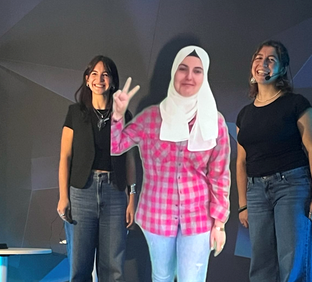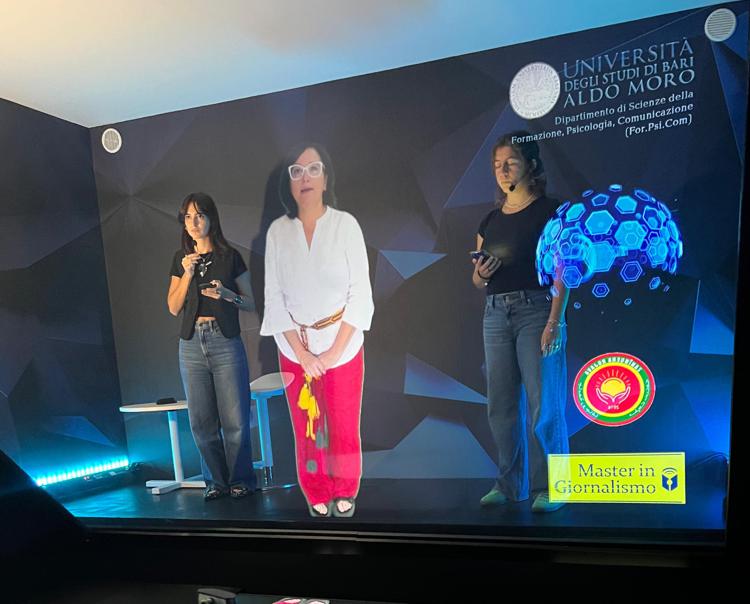Thanks to a new experimental device, the first ‘holographic phone call’ between the University of Bari and the University of Rojava (Syria) has been successfully completed.
How many times have we said to a loved one, ‘I wish you were here’. This wish becomes even stronger when our loved one is in danger.
Well, this dream could soon become a reality thanks to the world’s first experiment in synchronous conversation through the live transmission of holograms (on a scale of 1:1) of two people thousands of miles apart.
In fact, the “holographic phone call” test carried out by the University of Bari and the company Predict Spa has been a resounding success.
The protagonists of the hologram study
The research was carried out by Marilù Mastrogiovanni as part of her PhD in Human Relations at the University of Bari, which started in January 2022.
PON Innovation PhDs require the identification of a technological partner, and for her study Mastrogiovanni chose the Predict joint stock company.
The Puglia-based company, which specialises in the development of healthcare technologies, non-invasive in-vivo diagnostics and healthcare robotics, made its augmented reality visor communication system and its R&D team available to the project.
The challenge was to be able to ‘communicate in holopresence’ without using HoloLens. In other words, the ability to see a live (life-size) hologram of the person you are talking to, hear their voice and see their movements.
And thanks to the positive collaboration between the public and private sectors, led by Loredana Perla, Professor of Pedagogy and Special Education, Director of the Department of Training, Psychology and Communication (For.Psi.Com.) of the University of Bari and of LARID (Laboratory of Educational Research), the goal was achieved.
Why Syria’s Rojava election
The University of Rojava in north-eastern Syria was the academy where the test phase was completed at the end of October 2023 (a few weeks before the end of the Syrian civil war and the flight of the dictator Bashar al-Assad).
Marilù Mastrogiovanni, a doctoral student in Special Education and General Sociology, chose this remote academy in Syrian Kurdistan for a specific reason: “The applications of this remote communication technology using holograms have yet to be explored. The new device is, of course, aimed at the infotainment and edutainment sectors, but futuristic connectivity scenarios are also conceivable,’ explains Mastrogiovanni (who is also a journalist and lecturer in investigative journalism at UniBa’s Master’s and Bachelor’s degree courses in Communication).
The research is based on the sociological study of the Italian ecofeminist movement, to imagine new forms of connection and interaction within restricted communities, using face-to-face and real-time holograms as a didactic tool to facilitate empathetic learning and greater student involvement. For example, we could bring together people who would otherwise never be able to move from where they are: war zones, prisons, refugee camps, lack of visas, etc. We can liberate the body and turn it from a battleground of oppression into a didactic tool for critical thinking,” concludes Mastrogiovanni.
A vision shared by Zilan Ehmed from the Department of Jineolojî at the University of Rojava: “We are delighted to be academic partners in this innovative research project. Jineolojî, ‘women’s science’, can truly be a revolutionary scientific paradigm that promotes social and political innovation, multiculturalism and the self-determination of individuals and peoples. In north-eastern Syria, despite the civil war and daily Turkish drone bombings, the Kurdish people are building a new political order based on ‘democratic confederalism’ and the construct of ‘Jin, Jan Azadì’ or ‘Women, Life, Freedom’. We hope to continue our collaboration with the University of Bari and the Larid Educational Research Laboratory and that this device of ‘liberating bodies’ will contribute to the dialogue with the Kurdish people and to the dissemination of their demands.
The result of the experiment
The new technology was presented on 26th November 2024 at the University of Bari during the 9th Forum of Mediterranean Women Journalists (FMWJ).
It is an intelligent solution that allows holographic telepresence to be established from anywhere in the world using a smartphone or tablet.
This is exactly what happened during the connection between the University of Bari and the University of Rojava in Syrian Kurdistan, the images of which were shown and the results of which were discussed.
For Professor Loredana Perla, “the For.Psi.Com department invests heavily in pedagogical research and new technological tools for teaching: we believe that the teachers of today and tomorrow must be able to adapt to the waves, even anomalous ones, of technological innovation, to imagine ever more attractive ways of teaching and learning, without ever losing sight of the humanism that must remain the basis of our ethical actions”.
Predict’s director, engineer Monica Carella, was also delighted: We are delighted to have been the technological partner of this innovative research project. This initiative with the Holographic Stage is an important milestone for the company as it is its first experiment abroad. It is an achievement that demonstrates the potential of this technology to open up new ways of teaching and take learning to a new level. Predict’s mission has always been to put technology at the service of people, and we believe that the Holographic Stage can become a valuable tool not only for education, but also for journalism and communication’.



